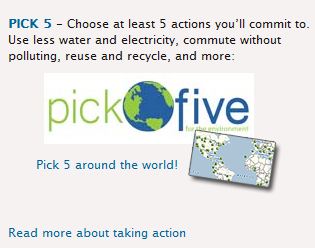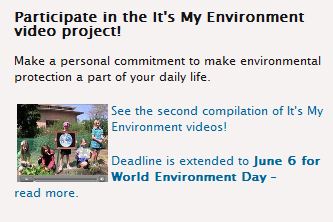Today is the observance two observances.
Christians today commemorate “Good Friday” – the day in which we remember the crucifixion of Jesus (regardless of what day of the week he was originally killed).
Today is also the annual observance of “Earth Day.”
Both focus on commitment to an entity bigger than ourselves, both focus on personal action and commitment.
Yet only one is religious. Right?
Strangely some very religious-sounding language is used by environmentalists and specifically the EPA’s website. Here’s a few examples:
- Belief.Faith is not believing something without evidence, but is believing in something that you can’t see or prove. People can have faith, for example, in the reliability of a friend – this is not to say there’s no evidence, but it cannot be proven that the friend will come through, even if they say they will. Christian faith is strongly based on evidence of the authors of the Bible. Environmental faith, as Al Gore explains in this video, is based on the beliefs of Al Gore and certain holy writings which consist of select research that Al Gore canonized based on whether they agree with his opinion:

- Repentance.Repentance speaks to the change of one’s mind that is reflected in a change of behavior. When Christians talk about repentance, they typically mean stopping harmful behavior and committing to healthier, holy, behavior. Here’s where the EPA falls with repentance:

Repent! Repent! Then participate in the 5 sacraments of environmentalism!
- Personal Commitment.The Bible speaks to the need not just for one time of belief or a period of repentance upon belief, but personal, daily commitment to wrap your life around Jesus. The EPA uses the very same language encouraging all to “Make a personal commitment to make environmental protection a part of your daily life.”

Read your Bible, pray every day? No! replace that commitment with making environmental protection a part of your daily life.
- Daily devotions. Many church kids grew up singing songs like “Read your Bible, pray every day!” There’s a general encouragement to be exposed to and affected by the Bible every day. There’s even daily text message services to get you a daily Bible verse, which is similar to what President Obama says is the extent of his worship. The EPA has an equivalent, and you can sign up to be notified every day with new instructions of how to be sanctified in their eyes.They’ve even got an alternative podcast to keep sermons in your ears!

Daily devotions in text and podcast from the EPA
- Community. Christianity cannot be practiced alone. The Bible speaks of groups of Christians as a body, both connected to and supporting each other, and urges Christians to meet together. The first thing on the Earth Day web page of the EPA is a link to find a church.. er… environmentalist events in your area to keep you involved in the faith.

Get plugged into a community of those who share your beliefs and live them out every day, all year. Christianity? Nope. Environmentalism.
- Evangelism. Even if a person has believed in Jesus, repented, committed, exercised daily disciplines, and is involved in community, they aren’t really a disciple of Christ unless they are also a disciple maker, spreading the word to others. The alternative is true as well – once you’ve committed your life to environmentalism, you must be an environmental evangelist to “spread the word” to get others to believe, repent, etc. Here’s my final clip from the EPA website:

Curiously, they've even capitalized "Environment" in the title but not the other words, similar to how Christians capitalize "God."
The EPA isn’t all. Earthday.org says you need to pledge, volunteer, evangelize, and even tithe… er… donate to the cause.
My purpose in highlighting the religious nature of environmentalism this Good Earth FriDay is not to say we should abuse the earth. That idea seems so absurd I’m not sure who thinks we ought to destroy our home, and normally when that claim is made, it’s simply to end the discussion by name-calling.
We ought to be responsible stewards of the earth. We should also recognize that environmentalism as it is being pushed by our government and others today is structured in a way to be opposed to other systems of truth claims, such as Christianity.



